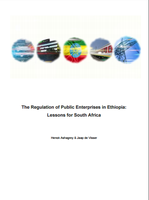Dullah Omar Institute Releases “The Regulation of Public Enterprises in Ethiopia” as part of its SOE series
In conducting research on governance of SOEs it is therefore important to examine how Ethiopia approaches key issues, such as the appointment of SOE board members, with the aim of learning lessons from other African countries and applying good practices in South Africa.
Government oversight over SOEs in Ethiopia is manifested in four ways. First, there are the government appointees on the board. Second, certain decisions of the SOE would be made subject to government’s approval. Thirdly, the Auditor-General audits the SOE’s accounts. Fourthly, the government may issue directives and orders to the company, thereby exercising control.
All in all, the legal framework for government oversight over SOE in Ethiopia is arguably less fragmented than its South African equivalent. Furthermore, it places greater emphasis on merit-based appointments and the need for clear lines of accountability between the CEO and the Board. However, this does not mean that SOE operations are immune from undue political interference. Ethiopia has recently embarked on a liberalisation process and is reducing its stake in many SOEs, which is an indicator of a change in approach to ‘state-led’ development in that country.
Director of the Dullah Omar Institute, Prof Jaap De Visser noted that “The paper shows that, in Ethiopia, SOE operations are not immune from undue political interference. However, the approach to SOE governance is different and this is reflected in the law. The Ethiopian law on government oversight over SOEs is less fragmented than the South African law. Furthermore, Ethiopia places greater emphasis on merit-based appointments and on the need for clear lines of accountability between the CEO and the Board. As our research indicates, these are issues where the South African law is lacking.”

